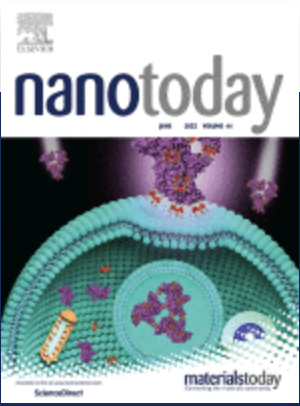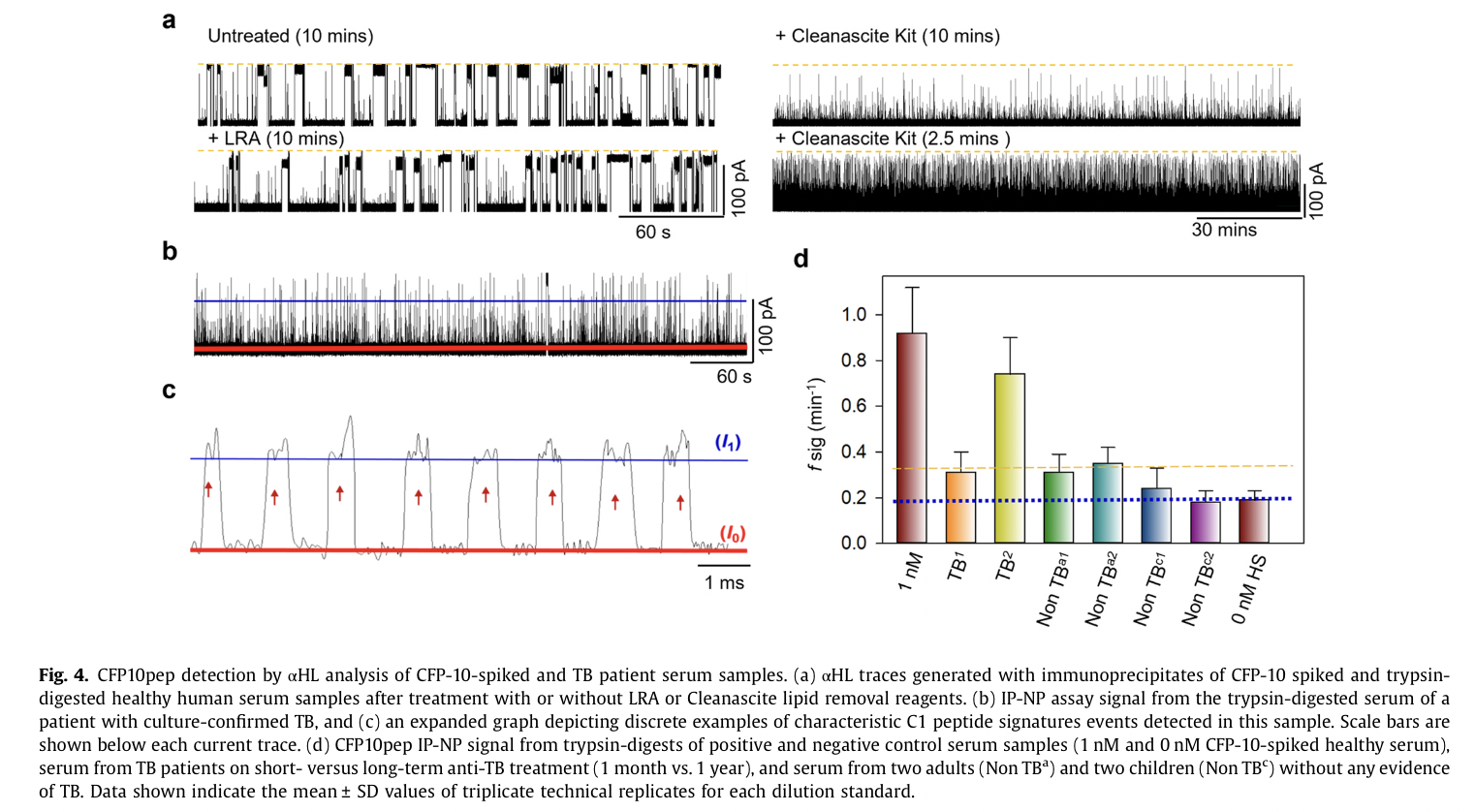|
Cleanascite™ Employed to Help Detect Tuberculosis Virulence Factors In Serum Biotech Support Group reports on an article, describing the simplicity and efficiency of their lipid clearance sample preparation technology to improve a nanopore sensor peptide signature in order to identify and detect target peptides Cleanascite™ Employed to Help Detect Tuberculosis Virulence Factors In Serum
MONMOUTH
JUNCTION, NJ
, June
24, 2022 -- Biotech Support Group reports on an article, describing
the simplicity and efficiency of their lipid clearance sample
preparation technology to improve a nanopore sensor peptide signature
in order to identify and detect target peptides derived from two
Mycobacterium tuberculosis (Mtb) virulence factors in serum. The
citation is:
Recent studies indicate that current signatures produced by peptide-nanopore interactions can distinguish high purity peptide mixtures, but the utility of nanopore sensors in clinical applications still needs to be explored due to the inherent complexity of clinical specimens. For this, the study describes a methodology to select trypsin-digested peptide biomarkers suitable for use in an immunoprecipitation-coupled nanopore (IP-NP) assay, to produce a characteristic nanopore interaction signature. A technical hurtle was overcome as at first, Nanopore analysis of samples resulted in frequent and prolonged pore blockades and unstable current baselines. This appeared to result from lipid or lipoprotein complexes that were non-specifically adsorbed by the immunoprecipitation matrix. This was markedly reduced when samples were lipid extracted before immunoprecipitation.
“Lipids can often interfere with many analytical platforms for measuring proteins and peptides. I am very pleased to see that this article demonstrates the efficiency of Cleanascite™ over another common commercially available reagent. Now with this simple and fast sample prep step, better methods to diagnose infectious disease based on peptide biomarkers may be soon forthcoming” states Swapan Roy, Ph.D., President and Founder of Biotech Support Group.
For
more information visit:
Cleanascite™
Lipid
Removal Reagent and Clarification,
at
About Biotech Support Group LLC Converging with cultural and technological disruptions forthcoming in healthcare, Biotech Support Group develops methods for cost effective and efficient sample prep essential for these expanding markets. Following a tiered business strategy, the company continues its growth in the consumable research products area supporting the rapidly expanding installation of LC-MS instrument and computational infrastructure. For this market, key products include: AlbuVoid™ and AlbuSorb™ for albumin depletion, Cleanascite™ for lipid adsorption, HemogloBind™ and HemoVoid™ for hemoglobin removal, and NuGel™ for functional proteomics. From these innovations, the company has acquired knowledgebase and biomarker intellectual property assets that support discoveries of protein markers from blood, with special emphasis on early detection and personalized medical decisions for cancer patients. For more information, go to http://www.biotechsupportgroup.com.
For Business Development , contact: Matthew Kuruc 732-274-2866, mkuruc@biotechsupportgroup.com |

- About
- Products
- Hemoglobin Removal Kits
- Lipid Removal & Clarification
- Urine Protein & Low Abundance Enrichment
- Class Specific Enrichment
- Sample Prep Mass Spectrometry
- Functional & Chemical Proteomics
- Genomic Sample Prep
- Accessories
- Technical Resources
- References
- Publications & Reports
- FAQs
- Case Studies
- Cleanascite™ Unlocks Insights into Lipid-Driven Tumor Immunosuppression
- NRicher™ Bead Platform Provides Unique Sub-Proteome Biases And Fit For Purpose Opportunities for Targeted LC-MS Quantification
- BSG Products To Assist in Analyzing Macrophage Polarization
- Ectodomain Shedding and Enrichment of the Soluble Membrane Proteome
- Investigate out of the Venn Diagram box
- Methods to selectively deplete or purify Hemoglobin from Dried Blood Spots (DBS)
- The Utility of HemoVoid™ is Demonstrated in 3 Proteomic Investigations Identifying Potential Disease Specific Biomarkers
- The 4 common features of our sample prep products, known as the BSG Advantage, are highlighted in a selection of journal references.
- AlbuVoid™ Workflows Advance Cell Secretome Proteomics
- Lipid Removal for Phenotypic Cell Response in Cancer Research
- The Influence of Sample Prep Bias on LC-MS Targeted Peptide Quantification in Serum Proteomics
- Re-imagining proteomics for developing precision medicine biomarkers of the innate immune response in SARS-CoV-2
- Patent Application Describes New Proteomic Methods to Monitor Protease Inhibitor Function During Covid-19 Infections
- Efficient Hemoglobin Removal Advances Red Cell Proteomics Offering Many New Insights Into Inflammation and Infectious Disease
- The Potential for New Blood Biomarkers in the Management of COVID-19 Disease
- Establishing the Utility of HemoVoid™ and HemogloBind™ as Enrichment Tools for Proteomic Analysis of Red Cells and Whole Blood in Parkinson’s Disease
- Species Diversity Supported By BSG Products
- Poster Report Describes Loss of Functional Serpin Activity In Cancer Patient Blood
- AlbuVoid™️ PLUS & AlbuSorb™️ PLUS Evaluating Different Windows of Observation Solves The Many Challenges of Serum Proteomics
- Tackling the Challenges of Serum Proteomics
- Lipid Removal Sample Prep for Cell Response Applications
- Sample Prep for Proteomic Analysis of Saliva
- Biotech Support Group Featured in Book, "Functional Proteomics – Methods and Protocols"
- Sample Prep Liquid Biopsy Products Suitable for Proteomic Profiling of a Variety of Body Fluid Sample Types
- Albumin and High Abundance Depletion
- Using HemogloBind™ as a Hemoglobin Binding Reagent
- Diverse technologies available for researchers to selectively bind or enrich exosomes and extracellular vesicles.
- Stroma Liquid Biopsy™ Biomarkers Profile Pan-Cancer Dysregulation of the Serum Proteome
- Diverse Depletion and Enrichment Technologies Enhance Simplicity and Efficiency of Obtaining Quality Proteomic Information
- Use On-Bead Digestion to Improve Time Required for Serum Digestion
- Using AlbuVoid™ as a Serum Protein Enrichment Kit in Functional Proteomics
- Using Cleanascite™ as a Lipid Absorption and Clarification Reagent
- Using HemoVoid to Remove Hemoglobin Before Analysis
- Blog
- Contact
- Liquid Biopsy
 Zheng,
Wenshu, et al. "
Zheng,
Wenshu, et al. "
